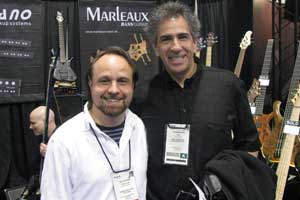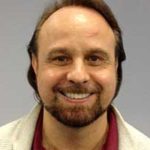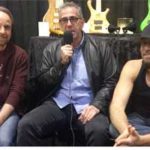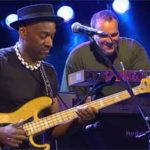Long-time Lionel Hampton bassist tells the story of coming to America, playing jazz and scoring films while becoming one of the East Coast’s busiest bass players!
Exclusive interview with FBPO’s Jon Liebman
December 28, 2009
Christian Fabian, born in Sweden and raised in Germany, studied at the Maastricht Conservatory with Henk Guldemond, principal bass player from the Concertgebouw Symphony Orchestra. He has performed throughout Germany, the Netherlands, Belgium, Austria and Hungary.
After receiving a scholarship to Boston’s Berklee College of Music, he settled in the USA and graduated Magna Cum Laude with a degree in performance and film scoring in 2000. He has since become one of the most sought after bassists on the US jazz scene while receiving numerous awards. He also studied with Herbie Hancock, Wayne Shorter, Billy Taylor, Mike Longo and other jazz greats.
In addition to becoming Artist in Residence at the University of Massachusetts and being the long-time bass player for jazz legend Lionel Hampton, Christian has performed with jazz notables Jon Hendricks, Jimmy Owens, Gary Burton, John LaPorta, Elvin Jones, Cheryl Bentyne, Ed Thigpen, Makoto Ozone, Chaka Khan, Bob Mintzer, Charlie Mariano, Rick Margitza, Gloria Gaynor and the Mike Longo Big Band. Christian’s latest CD, Keys in Ascension, was released in October.
FBPO: Talk a little about your musical upbringing. You’d already done a lot of performing throughout Europe before coming to the U.S. How were you raised, musically speaking?
CF: I come from a musical family. My father plays the violin and my mother was a cello player and a wonderful singer with a beautiful voice. Neither of my parents was a professional musician, but both were natural musicians, coming from families where music was an important part of family life. In pre-war Europe, most families had pianos and live music was a primary form of entertainment.
My father was conservative and didn’t know a lot about jazz, so when I told him I wanted to go to America to study it, he was very opposed to the idea. He didn’t understand how important America was for jazz. Once I became a member of the Lionel Hampton Big Band, though, he changed his mind completely because he knew who Lionel Hampton was! From that point on, he was happy for me and very interested in my career here.
Before that point, it had been an uphill battle. My father insisted I study only classical music and I was not allowed to play the instrument I really loved to play then—the trumpet. I had to choose from four instruments: guitar, flute, piano or violin, because my parents thought everyone should learn an instrument and these were the instruments to learn. My two older brothers each had to play an instrument as well. One took up the violin and the other played piano and clarinet, leaving flute and guitar. The flute seemed weird to me, so I picked the guitar.
My first teacher was cool, but intimidating, which resulted in me not practicing. The next teacher was apparently not intimidating enough and I gave up, since I wasn’t learning.
Then one day I went to a dance at our school and all of my brother’s friends were playing in the band. They sounded great and the bass player looked really cool standing in the back in the shadow and I thought, “I think I like that.” I got my first bass guitar from a friend who wanted my Norwegian scout hat, so we traded. Neither of us cared that the guitar had belonged to a guy who was in prison. I was just happy to have my first bass guitar.
My first real bass teacher talked me into learning the upright bass and getting a classical education. He said I would get all my technique from that approach. I dropped the bass guitar and focused on the upright bass with the intention of studying that after school. I got rejected from the college in Cologne and a friend told me about a conservatory across the border in Holland. It was in Holland where I met Emiel van Egdom, a teacher who had gone to Berklee College of Music in Boston, and I started taking private lessons with him. He said: “I will be in LA doing a record [at Mad Hatter Studios with John Patitucci and Corey Allen] and if you want you can come and visit me and keep studying.” I was ready! I went and lived in LA for several months. I ran into a lot of musicians and everyone talked about Berklee College of Music. All of them, including Brian Bromberg, wrote letters of recommendation on my behalf and I ended up going to Boston after receiving a scholarship.
FBPO: Did you come to America specifically to study at Berklee College of Music?
CF: Yes, that was my main motivation. I had heard so much about the school and the TV series Fame was very big in Germany at that time. I just loved that show. I loved watching it and got an idea to go to the States and study there.
FBPO: In addition to getting a degree in performance, you also concentrated in film scoring. Were you thinking about pursuing a career as a composer or did you always know you wanted to be a bass player?
CF: Film scoring is my long-term goal. Once I get tired of moving around, I want to write for film. Maybe in a few years. Whenever I walked through the film scoring department at Berklee, my heart would start beating faster and I got a little nervous and excited. I thought it would be so cool if I could do that, so I doubled up my major in the second year to a dual major and added film scoring. I also had to play in the “project bands” where we played a lot of music from the jazz composition majors. It was a lot of fun, but sometimes I thought they got too caught up in the technical aspect of the exercise.
I liked that when you write for film you have to convey an emotion, and I thought that studying film scoring would teach me that specific aspect, which it did. I loved doing that major. Berklee College now has one of the best departments in the country for film scoring. When I first arrived there, the department was only three or four rooms. By the time I graduated, it was stretching out over two floors with state-of-the-art equipment and two high quality-recording studios.
I also did tons of recording sessions there. They had about 6 to 8 first class recording studios back then. It was at Berklee where I fell in love with being in the studio. I used to be frightened and so nervous that my hands cramped up! Now I prefer the studio to live performance and do my best playing in that environment. In the studio, everyone is always focused. No one gets distracted. It should be like that on a gig too, but most of the time people are too worried about the audience or their playing, so they forget the essence of the music. It doesn’t happen all the time, but I do see it. It happens to me sometimes, too.
This is something I’m working on right now with Mike Longo, my teacher here in Manhattan. Mike played many years with Dizzy (Gillespie) and teaches me everything he learned from Diz. I’m so happy about that and feel like all the secrets from Dizzy and Charlie Parker get passed on to me! Mike was very close to Dizzy, and also to James Moody and Jon Faddis, who were at Dizzy’s bedside when he died.
FBPO: Berklee has launched the careers of so many great players. Would you say that’s how you got established as a bass player, paving the way for the gigs you obtained with Jon Hendricks, Gary Burton, Elvin Jones, Cheryl Bentyne, Bob Mintzer and so on?
CF: Yes!!! Definitely!!! Gary Burton liked the band I had put together in college, which included Antonio Sanchez, who is playing now with Pat Metheny, and everyone else. He sent us to Japan to advertise for the college and we played a major festival, as well. I also had a chance to play with Makoto Ozone at that time and it was just an amazing experience. It was a fusion band with all original compositions. Tiger Okoshi, who is also a Berklee alumnus, was in charge and oversaw getting the band ready for Japan. We practiced a lot and eventually went over there for ten days.
Berklee is great that way. If they like you, they promote you. They always said that you get out of the college what you put into it and it’s absolutely true. I try to get that across to my students.
I wouldn’t say the way was paved. It was a little rockier than that. I still had a lot to learn about playing and about the business after I graduated, and I’m still learning. I still take lessons today to learn from musicians, like Mike Longo, what I need in order to play with people like Dizzy. It’s great that Mike tells me what would or wouldn’t have flown with Dizzy. It’s so helpful to have that standard.
FBPO: How did the Lionel Hampton gig come about?
CF: Brian Bromberg, who was the house bass player for the Lionel Hampton Jazz Festival, had so much work that he asked the director, (Doc) Lynn Skinner, if I could help him out. I was a student and Brian thought it would be the perfect learning environment for me, and he was so right! Jimmy Woody, who also played many years for Duke Ellington and other jazz greats, was the bass player in the Hampton Big Band. He was living in Switzerland and stayed in Europe for the most part and couldn’t do all the gigs with Hamp.
So, in 1997 while I was still in College I auditioned for the Big Band. There were only three people in the room: Lionel himself, Kuni Mikami, the piano player, and Lynn Skinner, executive director of the festival. Believe it or not, at 88, Lionel called “Giant Steps.” Luckily, a band in Boston did that song a lot, so I was ready to play and solo over it. Lionel loved it! He called a blues after that and then we played “Hamp’s Boogie Woogie” or “Flying Home,” I can’t remember. That was it! From then on I was a member of the Big Band, and I’m a member to this day. We don’t play that much, but the band still rocks. It’s still one of the hardest swinging big bands I play in, next to Mike Longo’s band, which is a real bebop big band. I really have to thank Brian for all of this. He somehow saw that I could do this and it turned out so great.
FBPO: In addition to having performed with a long list of jazz greats, you’ve also been quite prolific as a leader in your own right. Tell me about the CDs you’ve released under your own name prior to your new album, Keys in Ascension.
CF: I just started as a leader in 2006, seriously focusing on writing and playing the music I love to play. The CDs have either electric or upright bass. I love both instruments, but prefer the groove stuff on the electric and the swinging stuff on the upright. The groove stuff works on the upright bass as well, but walking bass is a little odd on the electric, once you know how great it can sound on the acoustic bass. I do it if I have to, though.
My touring trio just got back from Europe and I played electric there for the most part just because of the traveling. It’s so much easier to travel with the electric bass. Anyhow, Across The Tracks (2006) and The Masters Return (2007) are upright CDs and Curtain Of Life (2007) and Of The Essence (2008) are electric. I used the same band, which included kayboardist Steve Hunt, who worked with Stanley Clark and Alan Holdsworth, and drummer Stephen Michaud, who played with David Hines. Special guest was Bill Vint from Aretha Franklin’s band on tenor and soprano sax and bass clarinet. I also used Lance Bryant, a tenor sax player from the Lionel Hampton band, for the electric CDs. The electric stuff is through-composed and open at the same time. Steve Hunt is an important part of those projects. He’s also the producer. He has an amazing recording studio up in North Chelmsford, MA.
A lot of the stuff we did was first takes. Anything that wasn’t a first take was very spontaneous. I would bring the lead sheets, but after that, anything goes! A lot of times I ask either Steve or Bill Vint to bring in a song or two. I love their playing and they are great composers as well. Bill Vint brings in some pretty heavy stuff and it’s great to have his writing on the CD. I loved to be surprised and it always turns out great. It’s terrific in the studio and it keeps me on my toes. It also helps give the CD more of a band sound. I also like the fact that I’m not the only composer on the albums.
The concept for the upright CDs is a little different. I play with so many different musicians and sometimes I just think, “Wow, I would love to do something with those guys on my next CD!” I get inspired by their playing and sound and that influences me in my writing. The jazz stuff is usually 50/50 in terms of material: 50% original material and 50% standards from the American songbook.
The Masters Return CD is dedicated to a lot of things, one of them being that all these musicians on the CD played and worked with Dizzy Gillespie: Mike Longo on piano, Lewis Nash on drums, Jimmy Owens on trumpet and flugelhorn and Andres Boiarsky on the tenor saxophone. I met all of them through the Lionel Hampton Festival over the years.
Across The Tracks started with Andy Laverne on piano. He is a great contemporary piano player and I truly love his sound. I asked him who he wanted on drums and he recommended Danny Gottlieb. I thought he was crazy but he actually called Danny and Danny said yes. I added Claudio Roditi on trumpet and flugelhorn. He was very important for this recording, since we played a song on this CD called “The Dolphin.” This is the only CD where this song is recorded the way the composer, Luiz Eca, actually intended it. Claudio met Eca in the early ’70s. The song was dedicated to Miles Davis and was meant to be a ballad. Stan Getz and Bill Evans played it much faster in a bossa/samba style. I played it a few times that way and it never felt right to me. I was so happy when Claudio relayed this information to me and I wanted to record it like Luiz Eca intended it, slow and with a Harmon mute, my favorite sound. My friend Corey Christiansen plays guitar and you can hear Mike Longo playing percussion the way Dizzy showed him. Across The Tracks is a little more contemporary than The Masters Return. Actually they’re two very different CDs.
FBPO: What kind of album is Keys in Ascension and how does it compare to your other releases?
CF: It features more horn players and much more arranging than the previous CDs. I always wanted to record an album like that. I’ve been doing a lot of big band writing over the last six years. Writing for four horns presented a challenge to me, but after writing so much big band music, it was a lot of fun and I’m very happy with the outcome.
Two years ago I walked into a hotel and my friend Don Friedman was playing piano. I had met him playing in the Hampton Big Band in Atlantic City. We didn’t know each other back then but immediately became friends. Don was playing piano and sounded great as usual and I thought, “We need to do a CD.” I know he knew Willard Dyson, one of the hardest working drummers in NYC and way underrated, so here was my next rhythm section. I added my four horn players: Brad Mason on trumpet and flugelhorn from John Mayer’s band, and brother of Elliot Mason on trombone from Wynton Marsalis’ band. I went to Berklee with Brad and Elliot and they also have a band together called the Mason Brothers. On tenor sax and soprano sax is Ada Rovatti, whom I met during the Sitka Jazz festival in 2007, and on alto and flute is the musical director from the Lionel Hampton Big band, Cleave Guyton.
FBPO: Are you thinking about your next CD yet?
CF: Always! I’m usually one or two CDs ahead and the next big CD will be a big band CD dedicated to Lionel Hampton. I’ve been working on it for a long time and my writing is coming together for it. Maybe I’ll do another electric CD in between. I don’t know yet, but this CD will be my next focus. I can’t wait to do it. There are some challenges to overcome but no more or less than usual. The band will include members of the Hampton Big Band, the Mason Brothers and a few other players. A lot of the arrangements will feature the upright bass, as well. It’s a work in progress, but it will be a lot of fun.
FBPO: How much time do you spend in Europe and abroad, compared to the U.S.? How would you compare the audiences in different parts of the world?
CF: Altogether, I spend more time in the US and I like it that way. I came here to learn from the best and I feel I’m not done yet. I get nervous when I’m gone for more than three weeks. I want to be in NY and I feel that this is my home right now. The audiences in Europe are great and appreciative, as I’m sure you’ve heard many times. What I learned form Lionel is that you always play your best, no matter how many people are in the audience. That’s what I do today and I focus on that, which also means I really pay not too much attention to how the audience reacts. I’m purely focused on the giving aspect of music, connected and present in the moment. Once that happens any audience turns around and people are up on their chairs and happy. I love when the connection happens and I learned that that has a lot to do with my attitude.
FBPO: You’re still a pretty young guy and we all look forward to hearing a lot more music from you. What lies ahead for you, musically? What would you like to do that you haven’t done yet?
CF: Well, more studying. I’ve been with Mike Longo now for seven years and we just got to the bottom of a lot of things. I love his teaching and lessons. That’s my main focus at the moment, plus learning more about music, playing the piano and more writing. I like to be creative.
There are a few other projects I should mention, including one I just started with Steve Hunt and a singer/drummer named Lewis Robinson. We are doing some new things you’ll hear more about in the near future. The other project is a fusion band called the Crane/Fabian project with Lance Crane, a great drummer! Japan’s biggest record label, King Records, just signed us. We also won, for the second year in the row, an award called the “Hollywood Music in Media Award for Best Jazz Artist.” It’s an award for independent musicians, but what thrills me is that both times we won with one of my compositions. It’s a fusion band featuring Frank Gambale, Eric Marienthal, Mitch Forman and other killer players. It’s doing really well right now and the whole thing started out as fun. I never would have thought we would be that successful with it. Not that we don’t deserve it! But it started with me writing some stuff with the only intention being to have fun. I guess that’s what music should be all about anyway.
I’m going on tour in Japan in April of 2010 with one of the best ukulele players on the planet, Herb Ohta. I met Herb on the Lionel Hampton festival many years ago. He stayed in touch with me and called me last summer to do this tour. So now we’ll be playing as a duo all over Japan. Amazing!
I would like to do more with the bow again, specifically with my jazz playing. I took a few lessons from Eddie Gomez, who’s one of the best at playing jazz bass with the bow, and I would like to do more. I got the concept down but have to do some serious practicing. Also, I never really practiced slapping. All my students love Victor Wooten and I finally understand how to do the thumb thing he is doing. They’re actually showing me how to do it. It’s great! So, I’m working on that or, let’s say, it’s on the list. A couple of other things are on my mind but I won’t jinx it if you know what I mean.
FBPO: What kinds of things do you like to do that aren’t necessarily musically oriented?
CF: Finding out the truth! I’m a truth seeker. Some of my friends call me a conspiracy theorist. A lot of things these days have been proved, so they’re not actually theories anymore, they’re proofs. As for conspiracy, it’s also been proven in these cases that a bunch of people got together to plan and act, so yeah, there are conspiracies. And if you really go down that road, The Declaration of Independence was a conspiracy and so was the Constitution!
I do spend a lot of time researching all kinds of things. On many occasions I get inspired to write music. If you look at my song titles, you can tell where I’m coming from. Some years ago, I had a writers’ block. Mike Longo had found information online about something called “The Release Technique” for his wife, who had had a minor stroke. It’s based on the teachings of Lester Levenson, who in 1952 was given a few weeks to live after his second major heart attack, and ended up not only surviving but prospering amazingly for another 40 years. So he basically became a truth seeker because he was going to die, discovered the truth, and then decided to design a method so other people could do what he did. So I did this Release Technique and got rid of my writer’s block. All of this goes hand in hand with what’s in Victor Wooten’s book The Music Lesson. I could go into detail but that would be another interview, and people can just go to the website www.releasetechnique.com, if they’re interested. It’s amazing stuff.
Thanks so much for giving me the opportunity to do this and thanks for your passion and hard work. I love your website! Keep it up!
Love and Peace



